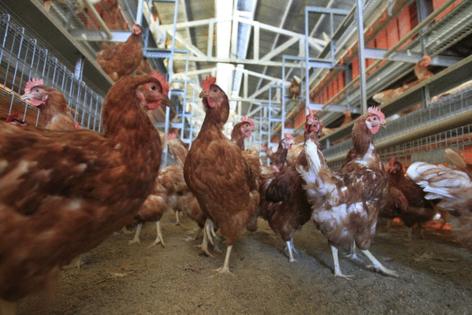Trump administration sues California over cage-free egg and animal welfare laws
Published in News & Features
The Trump administration has sued California over the state's voter-approved animal welfare law, which protects hens, pigs and calves from being kept in small cages, claiming the law has driven up egg prices and violates federal farming laws and regulations.
"California has contributed to the historic rise in egg prices by imposing unnecessary red tape on the production of eggs," wrote lawyers in the lawsuit, which was filed in U.S. District Court in Los Angeles on Wednesday.
California Gov. Gavin Newsom and Atty. Gen. Rob Bonta vowed to defend the state law.
"Pointing fingers won't change the fact that it is the President's economic policies that have been destructive. We'll see him in court," Bonta said in a statement.
California's animal-welfare law was approved by voters as Proposition 12 in 2018. The law was upheld by the U.S. Supreme Court in 2023.
"In a functioning democracy, policy choices like these usually belong to the people and their elected representatives," wrote Justice Neil Gorsuch, a Trump appointee, in the lead opinion. He said that while many state laws may have economic effects in other states, they are only in violation of the Constitution if they were written with the intent to interfere with interstate commerce.
The Department of Justice contends the California law preempts federal laws, including the Egg Products Inspection Act, and that no state has the right to institute its own standards on the production or "quality, condition, weight, quantity or grade" of eggs that differs from those set by the federal government.
The law has been repeatedly challenged by the National Pork Producers Council and others. Just last month, the Supreme Court declined to accept a petition for certiorari from the Iowa Pork Producers Council.
In the suit filed Wednesday, the Justice Department contends that California's egg standards "do not advance consumer welfare" and are "not based in specific peer-reviewed published scientific literature or accepted as standards within the scientific community to reduce human food-borne illness ... or other human or safety concerns."
Egg prices soared earlier this year, soon after Trump took office. Most experts pointed to the H5N1 bird flu epidemic as the cause of the spike, as millions of egg-laying chickens across the nation were euthanized to prevent the spread.
Prices have since moderated as the outbreak has diminished. In the last 30 days, there has been only one reported commercial flock infection in Pennsylvania. The birds were not egg layers.
In February, the U.S. Department of Agriculture's Secretary Brooke Rollins, penned an op-ed in the Wall Street Journal suggesting the Trump administration would target the law.
California egg producers have in the past opposed changing the law.
Bill Mattos, president of the California Poultry Federation, said in an interview in February that California egg farmers had spent millions of dollars to upgrade and adapt their farms. Reversing the law would put California poultry farmers — and all the other egg producers that sell to California — at a huge economic disadvantage by requiring them to invest millions more dollars to buy cages and re-adapt their facilities for such operations.
Animal welfare advocates say the lawsuit is short-sighted and has the potential to hurt California's egg-laying industry.
"With this ill-considered legal action, the Administration is dropping a set of stink bombs into the bosom of the egg industry," said Wayne Pacelle, president of Animal Wellness Action and the Center for a Humane Economy.
He said California egg farmers are still recovering from the bird flu outbreak, and this suit, if successful, would disrupt the still fragile supply chain "and provide an opening for egg farmers from Mexico — which have no animal welfare standards at all — to access the California market."
_____
©2025 Los Angeles Times. Visit latimes.com. Distributed by Tribune Content Agency, LLC.







Comments